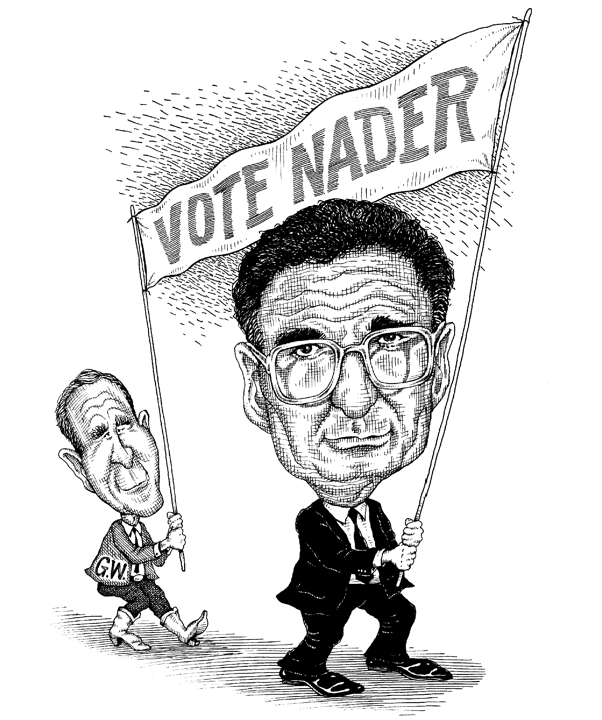 Ralph Nader gets a lot of heat on these pages - not so much for his ideas, but for the fact that he's disingenuous in trying to use the bully pulpit of consumer activism outside of the establishment rather than working for incremental change from the inside. His tactics were perhaps appropriate in the activist 60's and 70's; however, the strategies that Nader continues clinging to just don't work in today's government.
Ralph Nader gets a lot of heat on these pages - not so much for his ideas, but for the fact that he's disingenuous in trying to use the bully pulpit of consumer activism outside of the establishment rather than working for incremental change from the inside. His tactics were perhaps appropriate in the activist 60's and 70's; however, the strategies that Nader continues clinging to just don't work in today's government.
The Don Quixote-cum-Jedi force has always been strong in Ralph, but probably even more so in his legions of supporters. Tilting at windmills while you have the steering wind of a cheering section (no matter how small) at your back is also an ego stroking exercise. But Ralph's idealized notion of how the system is supposed to operate,“in the public interest”, just doesn't fit today's political memes.
It’s human nature that as time goes by, we learn from life’s experiences. It's part of growing up. Our ideals might not change, but our strategic approach evolves for achieving the goals that those ideals entail. A confrontational strategy (one that we might be forgiven for due to youth and inexperience) doesn’t necessarily translate to action as we gain real-life experience. Ralph Nader, for whatever reason, hasn’t embraced the need to modify strategy as both he and his causes have grayed.
Criticisms of Nader aside, his argument that both Republican and Democratic party office holders are often times just two sides of the same, beholden, coin is most certainly true. Our elected representatives, regardless of party affiliation, don't even bother anymore to hide the obvious conflicts of interest in the "fuck Grandma Millie" era of big government. What's more depressing is the way that many people, inside and outside of Washington, have come to accept that this is just the way the people's business gets done.
Nader's activist group, Public Citizen, released a report yesterday on recent changes to the Medicare system, with a focus on the new prescription discount card program. From the very beginning of discussions on the new plan, it was obvious that such changes were being driven by both the pharmaceutical and managed healthcare industries. During the congressional debate on the prescription discount card program, I recall listening to a congressman on CSPAN, from the House floor, claiming that in advance of what was almost a guaranteed passage of the bill, pharmaceutical companies had increased prices 25% to 35% across the board. Interestingly enough, this is almost exactly the same average discount that was being touted in the prescription drug program. So in essence, prices were raised, the bill was passed, seniors now have to pay for the card, prescription prices are basically the same, and the bottom line of the pharmaceutical companies just grew fatter.
Beyond the real lack of help to seniors in the prescription drug bill, one significant administrative point really jumps out of the Public Citizen report:
At least 11 top staffers who left the Bush administration lobbied for the drug industry and HMOs in 2003. White House and administration insiders working as lobbyists on the Medicare bill included several former top advisers to Bush, Vice President Dick Cheney and Department of Health and Human Services (HHS) Secretary Tommy Thompson. The exodus from the administration has accelerated since Bush signed the new Medicare law.Bold. Brazen. Eleven top staffers who helped write the lion's share of the Bush Administration's healthcare and pharmaceutical legislation over the past three years now work for big pharma and managed healthcare organizations. $141 million in lobbying costs. And the list goes on and on. Yep, they know where their bread was (and is) buttered. Would the end result have been any different with a Democratic Party administration or congress? I rather doubt it.
The Public Citizen report is the reason I began this posting by going off on Ralph Nader. This is important stuff, and could most certainly be used to advantage in Democratic Party campaigns this fall for both the presidential and congressional races (although part of the problem is that the Democrats are not clean on these issues, either). And in this respect, I fully support Nader’s ideology, if not his methodology.
In a utopian model of the political world, Nader would work for incremental changes to both the laws and the deliberative process that leads to legislation. The best way to do this work would be within the party that's most closely aligned with his goals, and certainly the Democratic Party fits this description. That he chooses to continue his Quixotic quest in the “margins”, so to speak, almost ensures that he and his supporters will remain marginalized by both parties. And because Ralph and Public Citizen remain marginalized, the import and impact of the report are marginalized.
It's easy to see, though, how even a veteran political operative like Ralph Nader can get jaded with an entire process that's supposed to make life easier for people, but more often than not results in day-to-day life being more difficult for the average person.